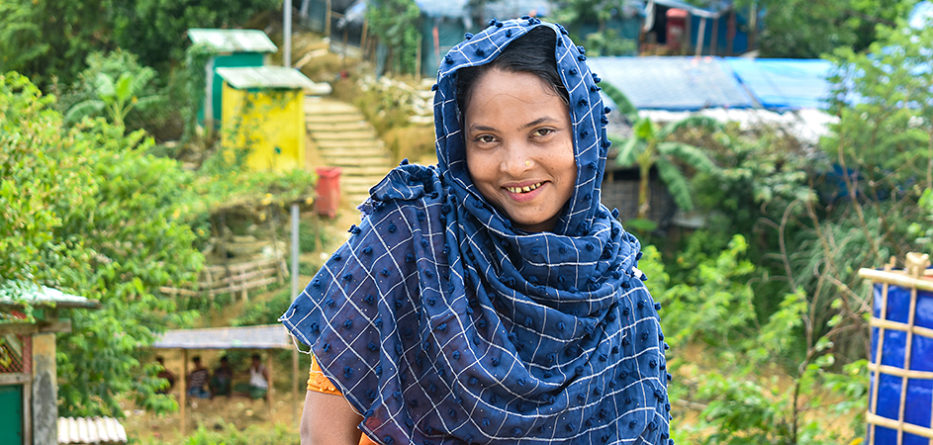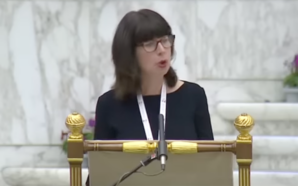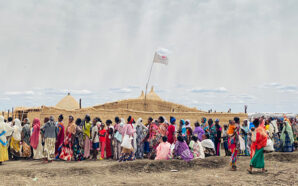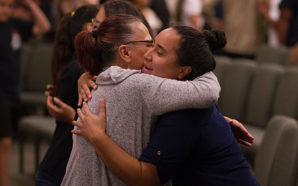For each of the six weeks of Lent, the Diocese of Parramatta is sharing one of Caritas Australia’s feature stories of lives changed through support and empowerment programs.
FIFTH SUNDAY OF LENT – 22 March 2021
Halima, Bangladesh
Halima is raising two children under seven in Bangladesh’s sprawling Cox’s Bazar refugee camp, while caring for her mother who has a disability. Widowed at just 21, she fled escalating violence in Myanmar’s Rakhine State in 2017, and arrived at the camp with nothing.
Caritas Australia, through its partner, Caritas Bangladesh, provided Halima with a shelter and cooking equipment so she could feed her family. She also participated in a water, sanitation and hygiene (WASH) program, before becoming a community WASH trainer herself – skills that became all the more invaluable when the COVID-19 pandemic hit.
Now, Halima is able to support her family’s basic daily needs, and hopes for a healthy, thriving and independent life for her family.
Halima’s husband was killed several years ago when a tree fell on him during a storm. She was left to fend for herself, caring for her young children and her widowed mother whose disability means she has difficulty walking. Then life in Myanmar became too dangerous.
“In Myanmar, we have always been victims of discrimination. We had no opportunity to go to school,” Halima says. “They started to bomb, shoot us and set fire to the houses in the village. Leaving our homeland and coming to an unknown country for us is just a matter of survival. I felt devastated inside.”
During the three-day journey to Bangladesh, Halima walked across mountains and through jungles, fearful of foxes and elephants, often struggling to carry her mother, and with little food.
As we heard in Jamila’s story in Week 1 of Project Compassion, over 1.3 million people are living in one of the world’s largest refugee camps in Cox’s Bazar. More than 700,000 Rohingya people have crossed into Bangladesh since August 2017, most of them women.[1] This has increased pressure on the local community, which was already struggling with poverty and limited educational and employment opportunities.
Halima arrived at Cox’s Bazar with no way of providing her children with their most basic daily needs – with no way to even protect them from the scorching sun.
Caritas Australia, through its partner organisation, Caritas Bangladesh, provided Halima with a stove and gas so she could cook for her family, and helped her to set up a makeshift shelter. As time went by, Caritas helped Halima to improve her new home by building retention walls and drains to protect it from monsoonal rains, and maintaining wells, toilets and waste management systems.
Halima also participated in a water, sanitation and hygiene (WASH) program, where she learned about safe hygiene practices, sourcing clean drinking water, and how to keep her family clean and healthy in the densely populated camp.
She was then appointed to the role of community mobiliser, and became responsible for inspecting and organising the cleaning of washrooms, wells and toilets in her block. She also shared her knowledge of safe practices with others in the camp.
Halima is proud that she’s able to earn a small income from her training role, while also helping to maintain the cleanliness of the camp community. Her son, now aged 7, and her daughter, 5, are adapting to life in the camp and have started attending school.
“My life has changed a lot after participating in the WASH program,” Halima says. “Before, my kids fell sick two or three times a month. Now I can keep my children clean, educate them and cover expenses for their needs. I can feed them balanced food and ensure our clothes are clean. I can afford a doctor and medicines for my mother.”
“Halima is an ambassador of change in her life and her best practices are being transferred, bringing change in the family and community level as well,” Caritas Bangladesh’s WASH Manager, Pius Nanuar says.
Over 2,300 households comprising around 10,580 people have benefitted from the program so far.
Halima aspired to ‘Be More’ for her family and for the community around her in the camp. Taking small steps, she made a big difference to their daily lives, sowing seeds of hope for the future.
Halima’s training became all the more invaluable as the COVID-19 pandemic struck, and- in an environment where safe hygiene, sanitation and preventative health measures became life-saving.
“I was very worried for my family and myself,” Halima says. “There was the possibility of it spreading very quickly since we live in a densely populated camp. We cannot maintain much distance with each other, everybody was worried about that.”
With the help of community mobilisers like Halima, Caritas Bangladesh and Catholic Relief Services (CRS) worked to minimise the spread of coronavirus by distributing information, hygiene kits, soap, masks and protective equipment, installing hand-washing stations, and conducting training sessions about COVID-19.
In the future, Halima hopes to live a peaceful life, with a secure livelihood – and perhaps someday, returning to her homeland.
“We will educate our children, make them empowered so that they can stand on their own. We will bring them up with dignity to secure their future,” Halima says. “My hope is that our children will be able to do a job, live with pleasure, and find their happiness. That will bring wellbeing for them.”
“We are very thankful to Australian people. We pray for their sound health and positivity so that they can keep stretching a helping hand as always.
“Thank you very much, Caritas Australia.”
To donate to Project Compassion, you can donate through Parish boxes and envelopes, by visiting www.caritas.org.au/projectcompassion or calling 1800 024 413.
With thanks to Caritas Australia.
[1] UNHCR https://data2.unhcr.org/en/situations/myanmar_refugees








